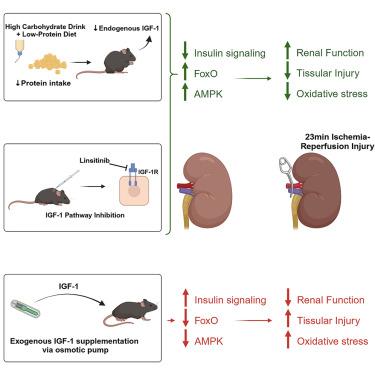Dietary or pharmacological inhibition of insulin-like growth factor-1 protects from renal ischemia-reperfusion injury in mice
IF 4.6
2区 综合性期刊
Q1 MULTIDISCIPLINARY SCIENCES
引用次数: 0
Abstract
One-week protein restriction (PR) limits ischemia-reperfusion (IR) damages and improves metabolic fitness. Similarly, longer-term calory restriction results in increased lifespan, partly via reduced insulin-like growth factor (IGF)-1. However, the influence of short-term PR on IGF-1 and its impact on IR are unknown. PR was achieved in mice via one-week carbohydrate loading and/or through a low-protein diet. PR decreased IGF-1 circulating levels as well as renal and hepatic expression. Upon renal IR, serum IGF-1 positively correlated with renal dysfunction and tissular damages, independently of sex and age. Exogenous IGF-1 administration abrogated PR benefits during IR, while IGF-1 receptor inhibition with linsitinib was protective. IGF-1 was associated with a reduction in forkhead box O (FoxO), and AMP-activated protein kinase (AMPK) signaling pathways previously demonstrated to improve IR resilience in various organs. These data support dietary or pharmacological reduction of IGF-1 signaling to mitigate IR injury prior to solid organ transplantation and beyond.

膳食或药物抑制胰岛素样生长因子-1可防止小鼠肾缺血再灌注损伤
为期一周的蛋白质限制(PR)可限制缺血再灌注(IR)损伤并改善代谢健康。同样,长期热量限制会延长寿命,部分原因是胰岛素样生长因子(IGF)-1 减少。然而,短期PR对IGF-1的影响及其对IR的影响尚不清楚。小鼠通过一周的碳水化合物负荷和/或低蛋白饮食来实现 PR。PR降低了IGF-1的循环水平以及肾脏和肝脏表达。肾脏IR时,血清IGF-1与肾功能障碍和组织损伤呈正相关,与性别和年龄无关。服用外源性IGF-1会减弱IR期间的PR益处,而使用林西替尼抑制IGF-1受体则具有保护作用。IGF-1与叉头框O(FoxO)和AMP激活蛋白激酶(AMPK)信号通路的减少有关,这些信号通路以前曾被证明能提高各种器官的红外适应能力。这些数据支持通过饮食或药物减少 IGF-1 信号传导,以减轻实体器官移植前和移植后的红外损伤。
本文章由计算机程序翻译,如有差异,请以英文原文为准。
求助全文
约1分钟内获得全文
求助全文
来源期刊

iScience
Multidisciplinary-Multidisciplinary
CiteScore
7.20
自引率
1.70%
发文量
1972
审稿时长
6 weeks
期刊介绍:
Science has many big remaining questions. To address them, we will need to work collaboratively and across disciplines. The goal of iScience is to help fuel that type of interdisciplinary thinking. iScience is a new open-access journal from Cell Press that provides a platform for original research in the life, physical, and earth sciences. The primary criterion for publication in iScience is a significant contribution to a relevant field combined with robust results and underlying methodology. The advances appearing in iScience include both fundamental and applied investigations across this interdisciplinary range of topic areas. To support transparency in scientific investigation, we are happy to consider replication studies and papers that describe negative results.
We know you want your work to be published quickly and to be widely visible within your community and beyond. With the strong international reputation of Cell Press behind it, publication in iScience will help your work garner the attention and recognition it merits. Like all Cell Press journals, iScience prioritizes rapid publication. Our editorial team pays special attention to high-quality author service and to efficient, clear-cut decisions based on the information available within the manuscript. iScience taps into the expertise across Cell Press journals and selected partners to inform our editorial decisions and help publish your science in a timely and seamless way.
 求助内容:
求助内容: 应助结果提醒方式:
应助结果提醒方式:


